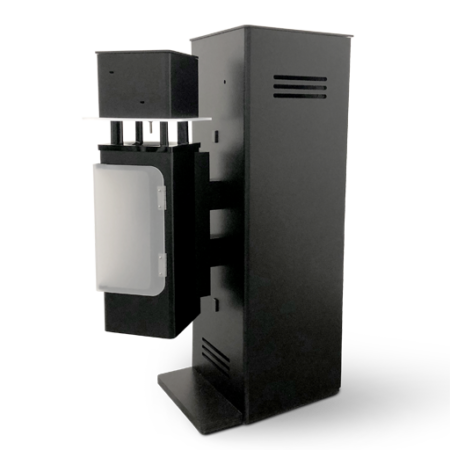They come to garden parties in the twilight – uninvited. They buzz around the guests, alight on their exposed skin and suck their blood. But soon mosquitoes will have nothing to celebrate; the uninvited guests will be no more than an unpleasant memory, at least if Simon Lillamand and Pierre Bellagambi have their way. They are the managing directors of the French company Qista.

Once a female mosquito is attracted to the device, another fan sucks it in and catches it in a net. (Photo | Qista)
“Both of us come from the south of France where there are lots and lots of mosquitoes,” says Lillamand. “We wanted to declare war on them, but with an ecological solution.” The chemical solutions often used, such as insecticides, sprays or lotions, also kill other insects and disturb the balance of nature. Since the natural enemies of mosquitoes are dying out, there are often even more of the nasty creatures.
Breathes like a human
To keep that from happening, Qista’s managing directors developed a mosquito trap that attracts female mosquitoes on their hunt for prey by simulating human breathing. Using an axial fan, the device emits carbon dioxide and a scent called octenol. Once a female mosquito is attracted to the device, another fan sucks it in and catches it in a net. In this way, the unit fights mosquitoes within a distance of 60 meters, reducing the nuisance by 88 percent.
“Our customers set up the mosquito traps outdoors in places like their yards, at swimming pools or on the terrace of a restaurant.”
Simon Lillamand, Managing Director, Qista
So far there are five versions for the French market, designed for private or public use. “Our customers set up the mosquito traps outdoors in places like their yards, at swimming pools or on the terrace of a restaurant,” says Lillamand. But even without mosquitoes, quiet and relaxation were still not to be had in these places because the fans previously used in the unit were too loud. So the two men asked ebm-papst in France for help. “The sales manager visited us in Aix-en-Provence and looked at our product and our production facilities,” says Lillamand. “Together we found axial fans that meet our technical specifications for air flow and pressure and also work very quietly.”
Future goal: curbing disease
The device has been on the market in France since 2015. More countries are slated to benefit from it in the future; Simon Lillamand and Pierre Bellagambi plan to sell it throughout the EU and, from 2021, also in the US and Canada. And the Qista managing directors are also looking for dealers to sell the product on European islands like La Réunion, where tiger mosquitoes often spread dengue fever or chikungunya. “We would also like to work with aid organizations in the future,” says Lillamand. “Then we could significantly reduce the likelihood of falling ill in those regions.”

Leave a comment